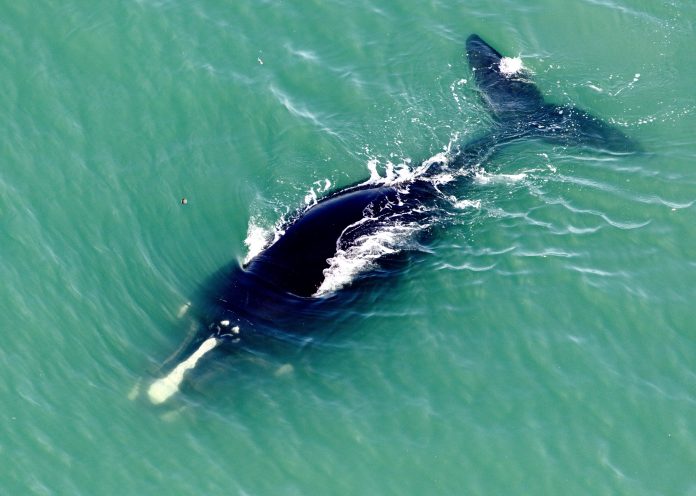The North Atlantic right whale population remains critically endangered, as highlighted in a new estimate from the North Atlantic Right Whale Consortium, which was released this week.
The 2023 data reveals that there are only approximately 372 whales remaining, a slight increase from last year’s estimate of 356 based on data from 2022. However, the species is still perilously close to extinction.
In 2024 thus far, at least four North Atlantic right whales have fallen victim to boat strikes and entanglement in fishing gear. In light of these ongoing threats, Oceana is strongly urging the National Oceanic and Atmospheric Administration (NOAA), Fisheries and Oceans Canada, and Transport Canada to enhance protective measures to prevent these majestic creatures from disappearing forever.
“While an increase in population is hopeful, the North Atlantic right whales washing up dead on our shores speak for themselves – we must stop killing them. Five of this year’s calves were killed or are missing and presumed dead, including the first calf of the season who was struck by a boat and died a slow, painful, and preventable death,” said Gib Brogan, campaign director at Oceana in the United States.
“NOAA’s proposed vessel speed rule to update slow zones for ships would have protected these whales when they were at their most vulnerable, but this plan is gathering dust after more than 800 days. President Biden must approve and implement the updated vessel speed rule soon, before we see moms and calves on our shores this calving season instead of in our waters, continued Brogan.
This urgent plea from Oceana underscores the critical need for decisive action to ensure the survival of the North Atlantic right whale. With their numbers alarmingly low, the world cannot afford to delay any longer in implementing robust protections for these vulnerable marine mammals.
“Today’s news that the North Atlantic right whale population has increased slightly is positive, but the threats of vessel strikes and entanglement remain present. Right whales have faced a devastating year, with nine deaths and five entanglements; and those are just the ones we know about. More must and can be done to stop the two major threats to right whale’s survival – vessel strikes and entanglements in fishing gear. To ensure whales and fisheries can coexist in Canada, the government must implement ropeless fishing gear in high-risk areas. Additionally, all vessel slowdowns must be mandatory and be applied throughout the range where right whales are found to reduce ship strikes,” said Kim Elmslie, campaign director at Oceana Canada.
The North Atlantic right whale, once abundant along the Eastern Seaboard, has faced dire challenges leading to its current status as one of the most endangered marine species. Historically, these majestic mammals were frequently targeted by whalers due to their coastal habitat, slow swimming speeds, and tendency to float when killed.
It is estimated that the right whale population, which peaked at around 21,000 individuals, plummeted to fewer than 100 by the 1920s due to aggressive whaling practices. Following a ban on hunting in 1935, there was a slight recovery, with numbers rising to approximately 483 individuals by 2010. However, this positive trend has alarmingly reversed, as modern threats now jeopardize their survival.
One of the primary dangers facing North Atlantic right whales today is vessel collisions. These whales swim at a leisurely pace of about six miles per hour and often stay near the water’s surface, making them especially vulnerable to boats. Their dark coloration and lack of dorsal fins further complicate their visibility to mariners. Studies have shown that the speed of vessels is a crucial factor in these accidents; at high speeds, boats are unable to maneuver effectively to avoid collisions, while the whales are too slow to evade danger. These collisions can result in fatal injuries, including blunt-force trauma or severe lacerations from propellers.
Entanglement in fishing gear is another significant threat to the North Atlantic right whale population. Each year, around one-quarter of these whales become entangled in fishing lines from lobster and crab traps in U.S. and Canadian waters. Approximately 85% of the population has experienced entanglement at least once. Such incidents can restrict their mobility and ability to feed and reproduce, and can even lead to death. The ropes can cut into their flesh, causing life-threatening infections, and the strength of these lines can result in severed fins, tails, or even bone.
Despite these challenges, there is growing public support for stronger protections for North Atlantic right whales. A national poll conducted in 2024 revealed that 86% of American voters believe efforts should be made to protect these whales from human-related threats. Additionally, 83% agree that ocean activities posing risks to the whales—such as shipping and vertical-line fishing—should be modified to enhance their safety. With urgent concern for their future, it’s evident that immediate action is vital to address the critical threats faced by the North Atlantic right whale and to ensure the survival of this iconic species. As stewards of the ocean, we must advocate for their preservation and adopt sustainable practices to prevent further decline.
To learn more about Oceana’s binational campaign to save North Atlantic right whales, click here.



